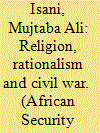| Srl | Item |
| 1 |
ID:
178045


|
|
|
|
|
| Summary/Abstract |
Public opinion research in the Middle Eastern context has seen a proliferation of data research that aims to track changes in the state of Arab attitudes. Yet, it remains unclear what is being measured and how representative the data is. This article aims to address this question by reviewing the extent to which and how the existing literature has addressed the issues of representativeness of Twitter communities and the validity of opinion measures derived from sentiment analysis in the Middle Eastern context. While some studies aim no further than to gauge the dynamics of Twitter debates, many others seek to generalize the larger public opinion trends. This raises questions about how representative Twitter users are of the general public, how asymmetric social media use is, and how participation routines vary. Furthermore, to what extent can sentiment analysis translate individual tweets into meaningful measures of expressed opinion, and how sensitive are means of aggregating opinions from sentiment analysis to variation in terms of tone and amount of text within and across individuals? Following a comprehensive review of existing research in the context of the Middle East, this article also aims to derive a clearer understanding of how collective Twitter opinion relates to public opinion and make some suggestions of ways to design sampling and coding procedures, as well as validation exercises to address measurement bias and error.
|
|
|
|
|
|
|
|
|
|
|
|
|
|
|
|
| 2 |
ID:
177036


|
|
|
|
|
| Summary/Abstract |
What role does religion play in understanding the outbreak of civil war? The purpose of this study is to offer an alternative understanding which conceptualises religion as discourse, religious identity as sacred narrative, and religious nationalism as a conflict over the power to shape interpretations of political legitimacy. A rationalist explanation for the role of religion in the outbreak of the Algerian civil war provides an empirical motivation for the argument. By conceptualising religion largely in rational-material terms, I contend that rationalists fail to appreciate religion’s unique attraction – the belief that the ultimate seat of political authority exists beyond the state and in some transcendent reality. As an alternative, I conceptualise religion as a discursive institution, explaining how the contest to shape a faith’s sacred narrative can result in physical violence. This exercise is a first step in a broader research agenda addressing how a robust theory of religious identity can enhance scholars’ understanding of peace and conflict.
|
|
|
|
|
|
|
|
|
|
|
|
|
|
|
|